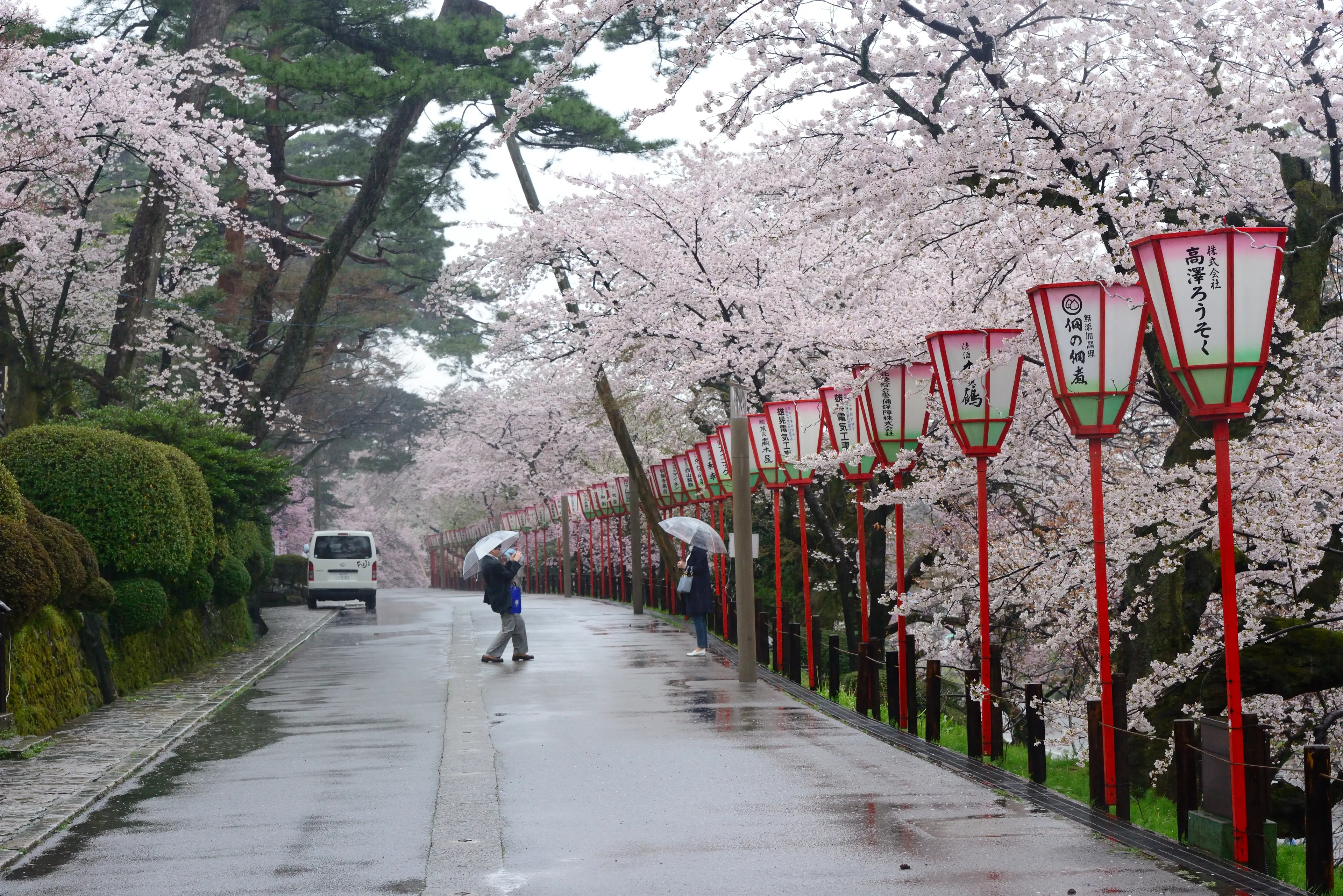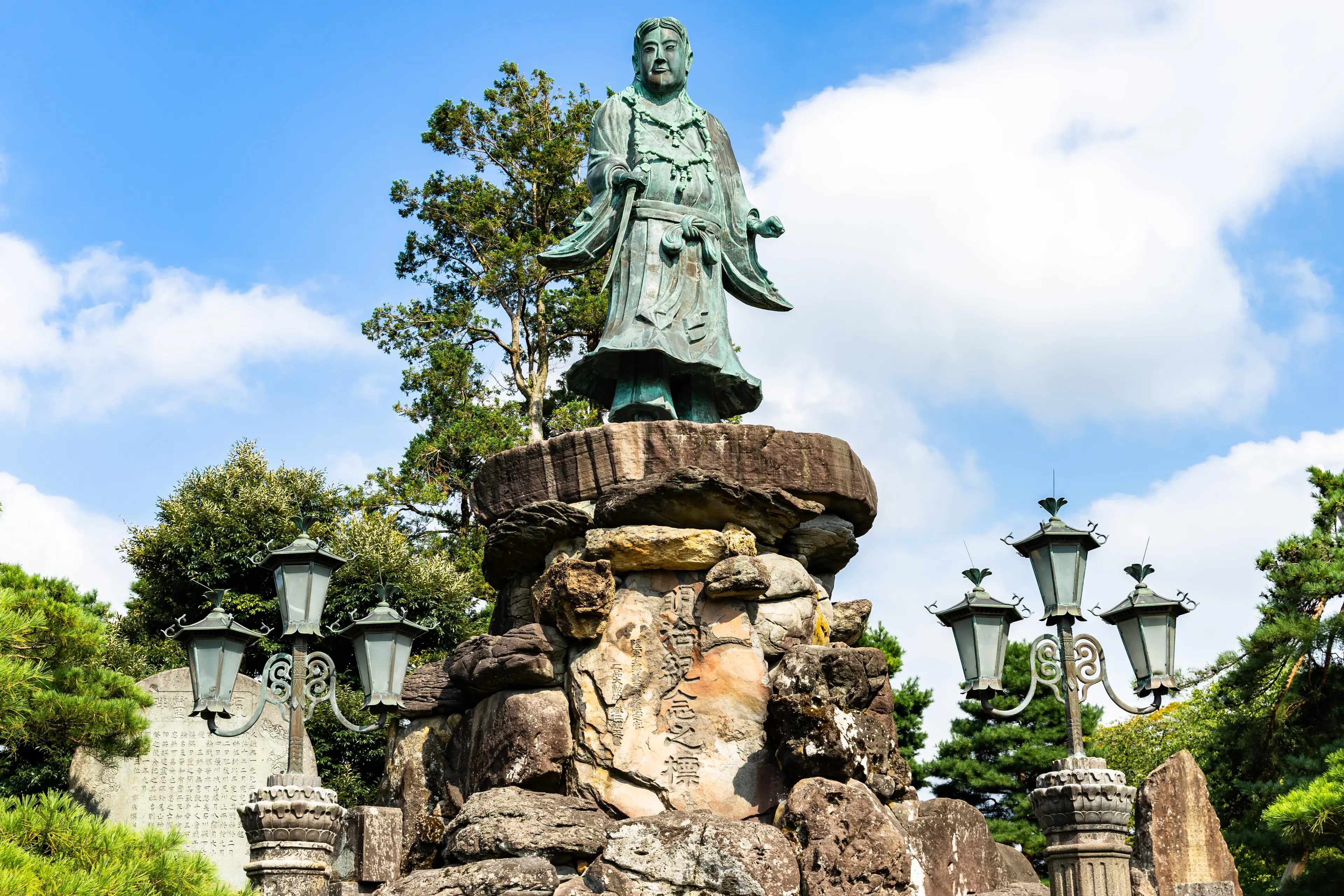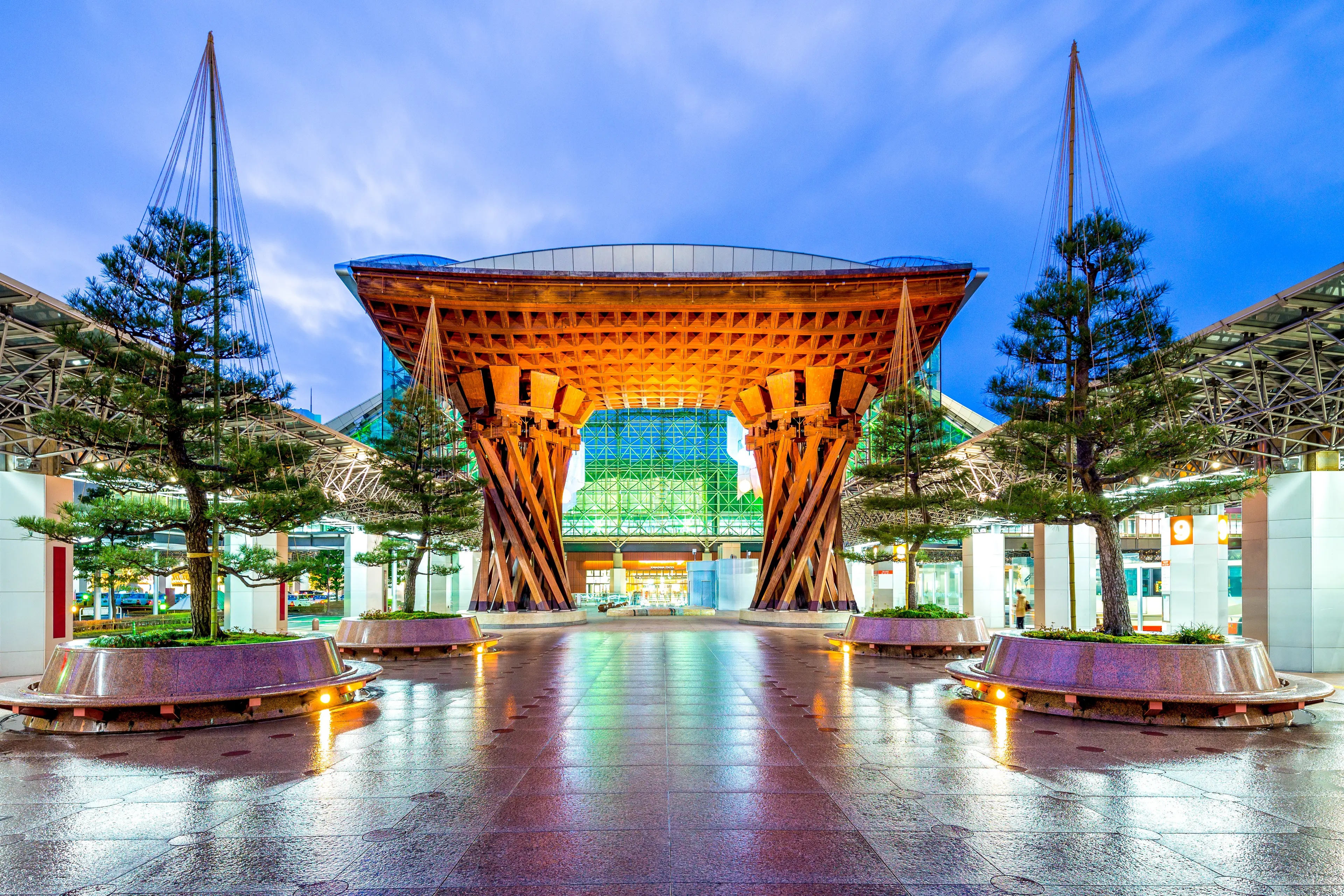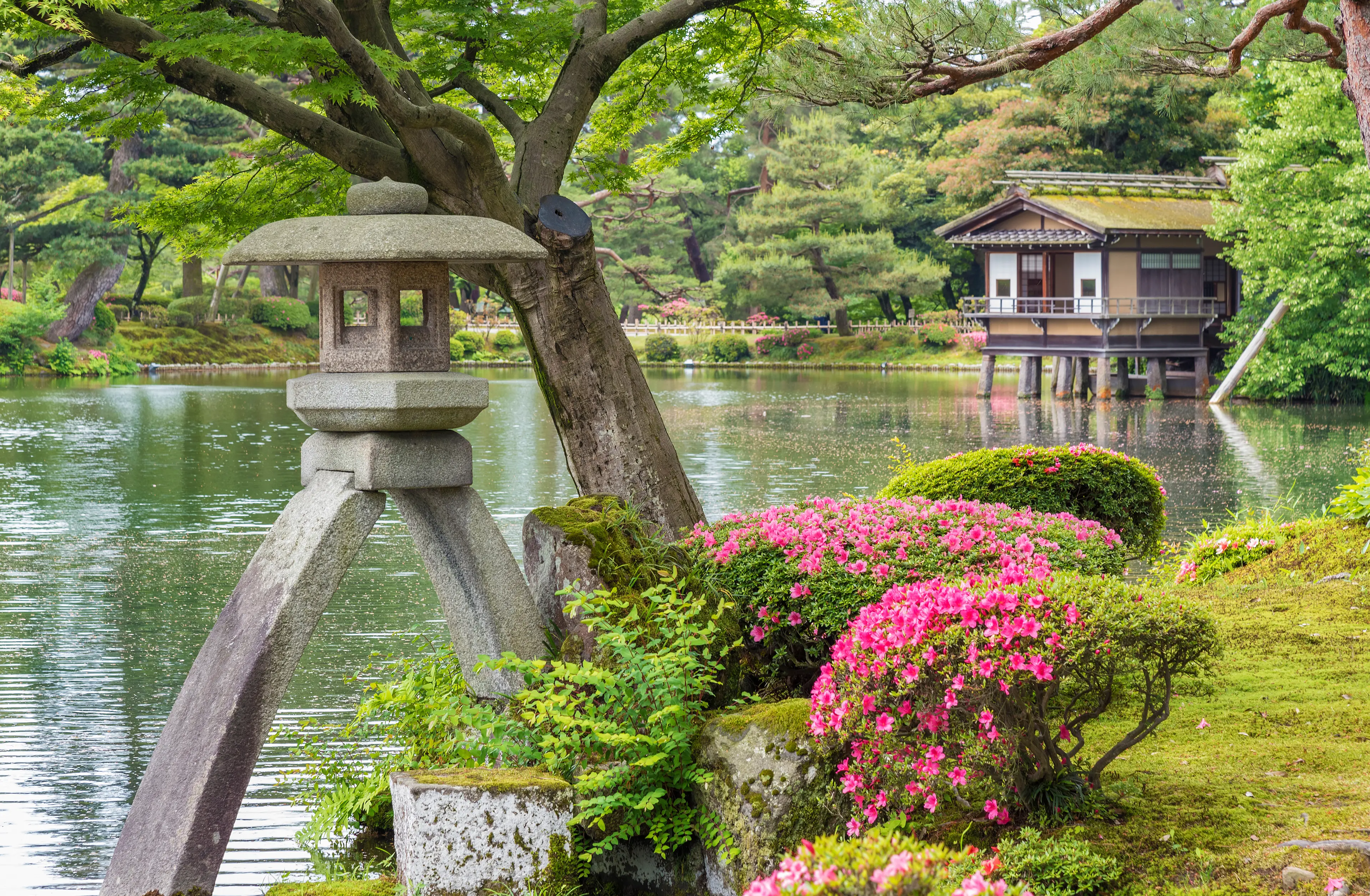3-Day Family Adventure: Relaxing and Sightseeing in Kanazawa, Japan
Kanazawa, Japan
3 days





About Kanazawa, Japan
Discover the timeless beauty of Kanazawa, Japan, a city where tradition meets modernity. Known as "Little Kyoto", Kanazawa is renowned for its well-preserved Edo-era districts, beautiful Kenrokuen Garden, and impressive 21st Century Museum of Contemporary Art. Experience the city's rich samurai and geisha heritage in the Nagamachi and Higashi Chaya districts. Indulge in Kanazawa's culinary delights, including fresh seafood and Kaga cuisine. Visit the bustling Omicho Market, or try your hand at gold leaf crafting, a local specialty. With its blend of cultural heritage and contemporary charm, Kanazawa offers a unique journey into the heart of Japan.
3-Day Itinerary
Day 2
Journey through Nagamachi Samurai District and Higashi Chaya District
Morning
Start your second day with a visit to the Nagamachi Samurai District. Explore the well-preserved samurai residences and get a glimpse into the life of a samurai during the Edo period.
Lunch
Enjoy a picnic lunch at the nearby Kanazawa Castle Park. The park offers stunning views of the castle and the surrounding city.
Afternoon
After lunch, visit the Omicho Market. This bustling market is a great place to experience local life and shop for souvenirs.
Dinner
For dinner, try some of Kanazawa's famous crab dishes at a local restaurant. The city is known for its high-quality seafood, and the crab is a must-try.
Evening
End your day with a visit to the Higashi Chaya District. This historic district is known for its traditional tea houses and geisha culture. Enjoy a traditional tea ceremony and experience a piece of Japanese culture.
Day 3
Discovering Myoryuji Temple and Relaxing by the Sai River
Morning
On your final day, visit the Myoryuji Temple, also known as the Ninja Temple. This unique temple is filled with hidden doors, secret rooms, and traps, making it a fun and educational experience for the whole family.
Lunch
Enjoy a leisurely lunch at a local restaurant. Try some of Kanazawa's famous curry, a local specialty that is both delicious and comforting.
Afternoon
After lunch, take a relaxing stroll along the Sai River. The river offers beautiful views of the city and is a great place to unwind and reflect on your trip.
Dinner
For your final dinner in Kanazawa, indulge in a traditional kaiseki meal. This multi-course meal is a culinary journey, showcasing the best of Kanazawa's local ingredients.
Evening
End your trip with a relaxing soak in one of Kanazawa's many onsen (hot springs). This is the perfect way to unwind after a busy day of sightseeing.
Attractions in Itinerary (7)

1Kenrokuen Garden
One of Japan's 'three most beautiful landscape gardens' featuring various plants, trees, ponds, and structures.

221st Century Museum of Contemporary Art
A museum of contemporary art that is known for its circular design and glass walls.

3Nagamachi Samurai District
A historic district where samurai and their families used to reside. It features restored samurai residences, earthen walls, narrow lanes and water canals.

4Kanazawa Castle Park
A large park that contains the Kanazawa Castle, a well-preserved feudal castle.

5Omicho Market
Kanazawa's largest fresh food market since the Edo Period. Known for its fresh seafood and local products.

6Higashi Chaya District
A traditional district known for its well-preserved tea houses where geisha perform.

7Myoryuji Temple
Also known as the Ninja Temple, Myoryuji Temple is a unique temple known for its many deceptive defences, traps, and escape routes. It was built during the Edo period and offers a fascinating insight into the era's architecture and the shogunate's restrictions on castle building.
Local Food and Drinks (12)

Kanazawa Sushi
Kanazawa Sushi is a popular local food in Kanazawa, known for its fresh and high-quality seafood. It's a must-try for sushi lovers visiting the city.

Kaga Cuisine
Kaga Cuisine is a traditional multi-course dinner that showcases the culinary arts of Kanazawa. It features local ingredients and seasonal delicacies.

Jibuni
Jibuni is a traditional Kanazawa stew made with duck or chicken, vegetables, and wheat gluten. It's a hearty and comforting dish, perfect for colder weather.
Kabura Zushi
Kabura Zushi is a unique type of sushi from Kanazawa, made with yellowtail and turnip fermented together. It has a distinctive, tangy flavor.

Nodoguro
Nodoguro, or blackthroat seaperch, is a high-quality fish often served in Kanazawa's sushi restaurants. It's known for its rich, buttery flavor.

Kanazawa Curry
Kanazawa Curry is a local version of Japanese curry, characterized by its thick, sweet sauce and served over rice with a side of shredded cabbage.

Warabi Mochi
Warabi Mochi is a popular dessert in Kanazawa, made from bracken starch and covered in kinako (roasted soybean flour). It's light, chewy, and not overly sweet.

Gold Leaf Sake
Gold Leaf Sake is a unique drink from Kanazawa, a city known for its gold leaf production. The sake is often served with a small piece of edible gold leaf floating in it.
Kanazawa Beer
Kanazawa Beer is a local craft beer, known for its high-quality ingredients and brewing techniques. It's a must-try for beer enthusiasts visiting the city.

Green Tea
Kanazawa is known for its high-quality green tea, often served in traditional tea ceremonies. It's a refreshing drink with a slightly bitter, grassy flavor.
Kanazawa Shigureni
Kanazawa Shigureni is a local dish made with beef or pork simmered in soy sauce, sugar, and ginger. It's a flavorful and satisfying dish.
Kakinomoto
Kakinomoto is a traditional Kanazawa dish made with persimmon leaves wrapped around sushi rice and mackerel. It's a unique and flavorful dish that showcases the city's love for seafood.
Best time to visit
The best time to visit Kanazawa, Japan is during the spring (March to May) and autumn (September to November) seasons. During these periods, the weather is typically mild and pleasant. Spring offers the breathtaking sight of cherry blossoms, while autumn showcases vibrant fall foliage. These seasons also coincide with several cultural festivals, providing tourists with a rich experience of Kanazawa's traditional heritage. However, it's worth noting that these are also peak tourist seasons, so it's advisable to book accommodations and activities in advance.
How to get around
Kanazawa Loop Bus
The Kanazawa Loop Bus is a convenient way to get around the city, with two routes that cover most of the major tourist attractions. The RL (Right Loop) goes in a clockwise direction, while the LL (Left Loop) goes counter-clockwise.
Rental Bicycle
Kanazawa is a bike-friendly city with numerous rental shops. It's a great way to explore the city at your own pace, especially the scenic areas like the Kenrokuen Garden and the Kanazawa Castle Park.
Taxi
Taxis are readily available throughout Kanazawa and can be hailed on the street or found at taxi stands near major attractions and train stations. They offer a convenient, though more expensive, way to get around the city.
Ridesharing
While ridesharing services like Uber are not widely available in Kanazawa, the local taxi app, JapanTaxi, can be used to book rides in advance or on-demand.
Kanazawa City Bus
The Kanazawa City Bus is a public transportation option that covers a wider area than the Loop Bus. It's a good choice for reaching destinations not covered by the Loop Bus.
Walk
Many of Kanazawa's attractions are located close together, particularly in the city center. Walking can be a pleasant and practical way to get around, especially when combined with public transportation for longer distances.
Hokutetsu Train
The Hokutetsu Train operates two lines in Kanazawa, providing access to areas not covered by the bus network. It's a good option for reaching destinations like the Ishikawa Zoo and the Motorcar Museum of Japan.
Rental Car
Renting a car can be a good option if you plan to explore the wider Ishikawa Prefecture. However, parking can be difficult in the city center, and traffic can be heavy during peak hours.
Important information
Currency¥ JPY
Time zoneUTC+9
Driving sideLeft
Emergency phoneAmbulance: 119; Fire: 119; Police: 110
Drinking waterYes
Power sockets
Voltage100 V
Things to know about Kanazawa, Japan as a first time visitor
1
Kanazawa is located on the west coast of Japan's Honshu island, in the Ishikawa Prefecture.
2
The city is known for its well-preserved Edo-era districts, art museums and regional handicrafts.
3
Kanazawa is a city that experiences all four seasons. Summers can be hot and humid, with temperatures reaching up to 86°F (30°C), while winters can be cold with occasional snowfall, with temperatures dropping to around 32°F (0°C).
4
The city is relatively compact and can be easily explored on foot or by bicycle. However, there's also a comprehensive bus network that can take you around the city.
5
Kanazawa is famous for its local cuisine, including fresh seafood from the Sea of Japan and Kaga vegetables. Don't miss trying the local specialty, Kanazawa curry.
6
The city is also known for its traditional crafts, such as gold leaf production and Kutani-yaki pottery. You can visit workshops to see these crafts in action.
7
Japanese is the main language spoken in Kanazawa. While some locals may speak English, it's a good idea to learn a few basic Japanese phrases.
8
The currency used in Kanazawa, like the rest of Japan, is the Japanese Yen (JPY). Credit cards are widely accepted, but it's also useful to carry some cash for smaller establishments.
9
Kanazawa has a reputation for being a safe city. However, like anywhere else, it's important to take basic precautions, such as not leaving your belongings unattended.
10
The city has a range of accommodation options, from luxury hotels to traditional Japanese inns (ryokan) and budget guesthouses.
11
Public Wi-Fi is not as widely available in Kanazawa as in some other Japanese cities. It's a good idea to arrange a portable Wi-Fi device or a SIM card for your trip.
12
The city is served by Komatsu Airport, which has domestic flights from Tokyo and other major Japanese cities. The Hokuriku Shinkansen also connects Kanazawa with Tokyo.
13
Kanazawa has a standard voltage of 100 V and a frequency of 50 Hz. The power plugs and sockets are of type A and B. If your country uses different plugs, you may need a travel adapter.
14
Tipping is not customary in Japan, including Kanazawa. Good service is expected and therefore already included in the bill.
15
The city has a number of convenience stores, known as 'konbini', which are open 24/7 and sell a wide range of goods, from food and drinks to toiletries and stationery.
16
Drinking alcohol in public places is legal in Japan. However, it's important to drink responsibly and respect local customs.
17
Smoking is not allowed on the streets in most areas in Kanazawa. Look for designated smoking areas instead.
18
In Kanazawa, as in the rest of Japan, it's considered polite to bow when greeting someone.
19
The city has a number of public baths, known as 'onsen'. Remember to wash thoroughly before entering the bath and follow the local etiquette.
20
Kanazawa is in the Japan Standard Time zone (JST), which is 9 hours ahead of Coordinated Universal Time (UTC+9).
Basic Japanese to know as a first time visitor
English phrase | Native phrase | Pronunciation | When to use it |
|---|---|---|---|
Hello | こんにちは | Konnichiwa | Greeting someone |
Goodbye | さようなら | Sayonara | Leaving or saying goodbye |
Thank you | ありがとう | Arigatou | Showing appreciation |
Yes | はい | Hai | Agreeing or confirming |
No | いいえ | Iie | Disagreeing or denying |
Please | お願いします | Onegaishimasu | Making a request |
Excuse me | すみません | Sumimasen | Getting attention or apologizing |
I'm sorry | ごめんなさい | Gomen nasai | Apologizing |
Do you speak English? | 英語を話せますか? | Eigo o hanasemasu ka? | Trying to communicate |
I don't understand | わかりません | Wakarimasen | Not understanding something |
Where is the bathroom? | トイレはどこですか? | Toire wa doko desu ka? | Looking for the bathroom |
How much is this? | これはいくらですか? | Kore wa ikura desu ka? | Asking for price |
I would like this | これが欲しい | Kore ga hoshii | Making a purchase |
Help | 助けて | Tasukete | In need of assistance |
Good morning | おはようございます | Ohayou gozaimasu | Greeting someone in the morning |
Good night | おやすみなさい | Oyasuminasai | Saying goodnight |
Delicious | おいしい | Oishii | Complimenting food |
I'm lost | 迷子になりました | Maigo ni narimashita | When you're lost |
Can I use credit card? | クレジットカードは使えますか? | Kurejitto ka-do wa tsukaemasu ka? | Asking for payment options |
Where is...? | ...はどこですか? | ...wa doko desu ka? | Asking for a location |
Packing List
Clothing
Underwear (3 pairs)
Socks (3 pairs)
T-shirts (3)
Pants or Jeans (2 pairs)
Comfortable walking shoes
Light jacket or sweater
Pajamas
Swimwear (if planning to visit a hot spring)
Toiletries
Toothbrush and toothpaste
Deodorant
Razor and shaving cream
Shampoo and conditioner
Body wash or soap
Facial cleanser and moisturizer
Sunscreen
Makeup and makeup remover (if applicable)
Prescription medications
First aid kit (band-aids, antiseptic wipes, tweezers)
Travel documents and essentials
Passport
Driver's license (for ID purposes)
Credit and debit cards
Cash (Japanese yen)
Hotel reservation confirmations
Travel insurance documents
Emergency contacts and important addresses
Electronics and gadgets
Smartphone
Charger for smartphone
Universal power adapter
Portable power bank
Headphones or earbuds
Camera (if not using phone camera)
Charger for camera
Miscellaneous items
Travel pillow
Eye mask and ear plugs
Snacks for travel
Reusable water bottle
Travel guidebook for Kanazawa
Japanese phrasebook or language app
Umbrella or raincoat
Backpack or day bag for daily excursions
Weather Conditions
Kanazawa, Japan is known for its diverse weather conditions, which can greatly influence your travel experience. Therefore, it's essential to plan your trip according to the season and weather patterns. Spring (March to May) in Kanazawa is quite pleasant, with temperatures ranging from 50°F to 70°F (10°C to 21°C). This is a great time to visit as the cherry blossoms are in full bloom, creating a picturesque environment. However, it's advisable to carry an umbrella as occasional showers are common. Summer (June to August) can be hot and humid, with temperatures often reaching up to 86°F (30°C). It's the season of the famous Hyakumangoku Festival, so despite the heat, the city is vibrant with cultural activities. Remember to stay hydrated and use sun protection. Autumn (September to November) is another beautiful season in Kanazawa, with temperatures ranging from 59°F to 77°F (15°C to 25°C). The city is adorned with vibrant fall colors, making it a perfect time for sightseeing. Light clothing with a few warm layers for the cooler evenings would be ideal. Winter (December to February) is quite cold in Kanazawa, with temperatures often dropping to 32°F (0°C) or lower. The city experiences heavy snowfall, turning it into a winter wonderland. If you're planning to visit during this season, make sure to pack warm clothing, including a heavy coat, gloves, and scarves. Regardless of the season, Kanazawa's weather can be unpredictable, so it's always a good idea to check the forecast before your trip. Also, keep in mind that the city is known for its high precipitation levels throughout the year, so carrying an umbrella or raincoat would be wise. Enjoy your trip to this beautiful city!
| Month | Hi / Lo (°C) | Weather Overview |
|---|---|---|
January | 8° / 0° | January is the coldest month in Kanazawa, with snowfall common. Dress warmly and enjoy the beautiful winter scenery. |
February | 8° / 1° | February is still cold with occasional snowfall. It's a great time to visit if you enjoy winter sports. |
March | 13° / 3° | March sees the start of spring, with temperatures gradually increasing. Cherry blossoms start to bloom towards the end of the month. |
April | 20° / 8° | April is a beautiful month to visit with cherry blossoms in full bloom. The weather is mild, perfect for outdoor activities. |
May | 23° / 13° | May brings warm weather and lush greenery. It's a great time to explore the city's parks and gardens. |
June | 26° / 18° | June is the start of the rainy season, so pack an umbrella. Despite the rain, the city remains vibrant and lively. |
July | 32° / 22° | July is hot and humid, with occasional rain showers. It's a good time to visit indoor attractions like museums and art galleries. |
August | 34° / 24° | August is the hottest month in Kanazawa. It's a great time to visit the beach or enjoy the city's summer festivals. |
September | 28° / 20° | September sees the end of summer and the start of autumn. The weather is pleasant, perfect for sightseeing. |
October | 22° / 14° | October offers beautiful autumn foliage. The weather is cool, making it ideal for hiking and outdoor activities. |
November | 16° / 8° | November is a great time to visit for autumn leaves viewing. The weather is cool and comfortable. |
December | 11° / 3° | December is chilly with occasional snowfall. It's a great time to enjoy hot springs and traditional winter cuisine. |
Did you know?
Places near by Kanazawa, Japan

Shirakawa-go
A UNESCO World Heritage site known for its traditional gassho-zukuri farmhouses.

Takayama
A city in the mountainous Hida region of Gifu Prefecture, known for its well-preserved Edo Period streets.

Kaga Onsen
A collection of hot spring towns south of Kanazawa, known for their healing properties.

Toyama
A city known for its beautiful bay area and the stunning Tateyama Mountain Range.

Fukui
A city known for dinosaur museum and beautiful gardens.

Kyoto
A city with numerous classical Buddhist temples, as well as gardens, imperial palaces, Shinto shrines and traditional wooden houses.

Osaka
A large port city and commercial center on the Japanese island of Honshu, known for its modern architecture, nightlife and hearty street food.

Nagano
A city known for its impressive Zenko-ji temple, a 7th-century Buddhist temple with major cultural importance.

Noto Peninsula
A peninsula known for its coastal scenery, traditional lifestyle and rural atmosphere.

Nagoya
Japan's fourth-largest city known for its modern architecture, including the futuristic-looking Nagoya TV Tower.